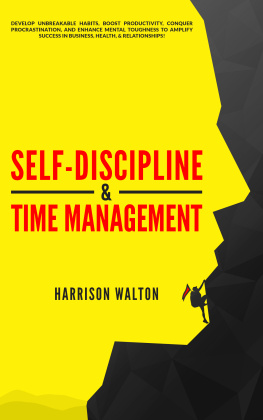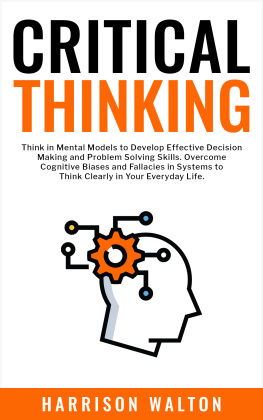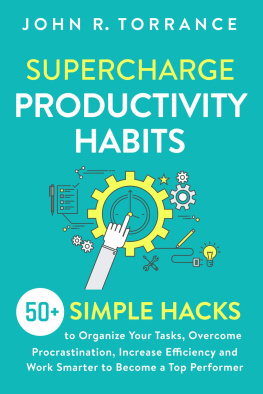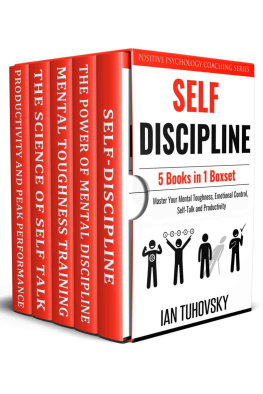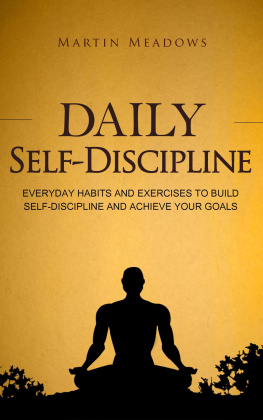Introduction - Self-Discipline
W eve all experienced it before: theres something we have to do, but even though we know this, we cant convince ourselves to sit down and get it done. Instead, we are overwhelmed with all of the distractions surrounding us. Our thoughts run rampant, eclipsing the voice in the back of our head telling us to get back on track. We feel out of control like we cant take charge of our own actions. Temptations are all around us, and foolishly, we keep giving in to them.
If this scenario resonates with you, then you are more than likely suffering from a lack of self-discipline. Self-discipline is all about being able to have control over yourself and what you do, say, or think. Because we live in a society that prioritizes pleasure over logic, we fail to realize that self-discipline is integral to our success in life. Without self-discipline, theres very little that we can accomplish, no matter how big our hopes and dreams are. We cant get to the place we want to be in life just by dreamingachieving success requires action.
Self-discipline is important for a variety of reasons, but the major one is the fact that having self-discipline can completely change the trajectory of your life for the better. You will not only be healthier and happier once you master self-disciplineyou will also find that you are a much more successful person in business, relationships, and numerous other areas of life. If you are reading this book, you may have low expectations for yourself and doubt what you are capable of achieving. Self-deprecation is no longer looked down upon; rather, it is expected. We limit ourselves by downplaying our abilitiesand as a result, many people do not realize the power that they have within them.
No matter how much you feel like your abilities are lacking, you are capable of achieving great things, both in your professional life and your personal life. You have the strength deep inside you to fight your way through anything life throws at you, no matter how tough. Developing a strong sense of self-discipline can completely change your life. This is coming from someone who has experienced firsthand how self-discipline can lead to great success. Before gaining a strong sense of control over my life, I often felt hopeless and lost. Now, I am on track to achieve many great things, and I consider myself a highly successful person. I firmly believe that I would not have been able to achieve what I have today if it wasnt for the fact that I dedicated myself to learning about self-discipline and how to apply it to my own life.
If you feel hopeless, you are not alone. By picking up this book, you are already on the path to success and to leading a fulfilling life. All of your dreams are attainable, and this book will show you how to begin taking steps to make your dreams a reality. Turning the next page is your chance for a fresh startone that will completely transform your life as you know it.
Chapter 1
The Proof Behind Self Discipline
S elf-discipline sounds appealing as a conceptbut what is the real scientific evidence behind it? You may be doubting that self-discipline is anything more than some words that people use to convince themselves that their life is on track. In actuality, self-discipline goes much deeper than thisand there is plenty of scientific proof to back this claim up.
The key to academic success, for example, is not having a high IQ, but rather having a firm sense of self-discipline. A study conducted by University of Pennsylvania psychologists Angela Duckworth, Ph.D., and Martin Seligman, Ph.D., found that, in a group of eighth-graders, students that ranked high in self-discipline had better grades, attendance, and standardized test scores than those with a high IQ. Therefore, self-discipline was determined to be more important than IQ scores in predicting ones academic success.
In addition to this study, research was done by June Tangney, Ph.D., and her colleagues found that students scores for self-discipline and self-control were correlated with higher grade-point averages, better self-esteem, lower levels of binge eating and alcohol abuse, and healthier, stable relationships. Developing a strong sense of self-discipline in childhood also can be a predictor of your success and health as an adult. This is not to say that you cannot develop healthy self-discipline as an adult; however, studies have proven that children with high levels of self-discipline and control grow into adults with better physical and mental health, fewer substance-abuse problems, fewer criminal convictions, and more financial security. Self-discipline and willpower impact all areas of ones life and act as a predictor of how successful you will ultimately be.
It is important to note that, though classifiers such as having high or low intelligence or being rich or poor do impact many areas of life, self-discipline still strongly controls and predicts adult success, regardless of these classifiers in childhood. A study of 1,000 children that took place over a 40-year period found that, regardless of how children were classified, having self-control as a child was a strong predictor of success later on in life. Enhancing ones levels of self-discipline can greatly reduce social problems that one may run into later on in life. Self-discipline levels in childhood go as far as impacting how successful of a parent an individual is. Within this study, those who had low levels of self-discipline in childhood were more likely to eventually lack skills in parenting compared to those with high levels of self-discipline in childhood. A lack of self-control, therefore, does not only impact you, but the generations of family that come after you. Many of the individuals studied with low self-control eventually became single parents with unplanned children living in a low-income household and struggling with various issues such as substance use, criminal records, and poor health.
Finally, one of the most telling pieces of this study is the analysis of how having self-control impacts mental health in adulthood. This study found that, of participants who scored in the bottom fifth levels of self-discipline and control, 22 percent of them had attempted or died by suicide before the age of 38. In contrast to this, only seven percent of individuals in the top fifth section of self-discipline scores had attempted suicide by this age. Individuals with poor mental health oftentimes have low levels of self-discipline, which increases their propensity to be unsuccessful in life and to suffer from a variety of mental health issues.
Furthermore, studies on large samples of individuals over long periods of time have proved the importance of self-discipline in living a successful life. In a sample study of over one thousand, New Zealanders found that self-discipline within the first decade of ones life predicts future success in terms of income, savings behavior, financial security, occupational prestige, physical health, mental health, substance use, criminal convictions, socioeconomic status, and overall intelligence. Therefore, one can note that self-discipline is one of the key indicators of how successful an individual will be within their lifetime. Though it is best to develop self-discipline from a young age (note that, if you have children, you should make sure to teach them principles of self-discipline), gaining a sense of self-discipline is possible no matter how far you are into your career. If you have found that you struggle to succeed in areas such as business and relationships, then you should start focusing on your levels of self-discipline. Even if you believe that you have some sense of self-discipline, this can always be improved.

